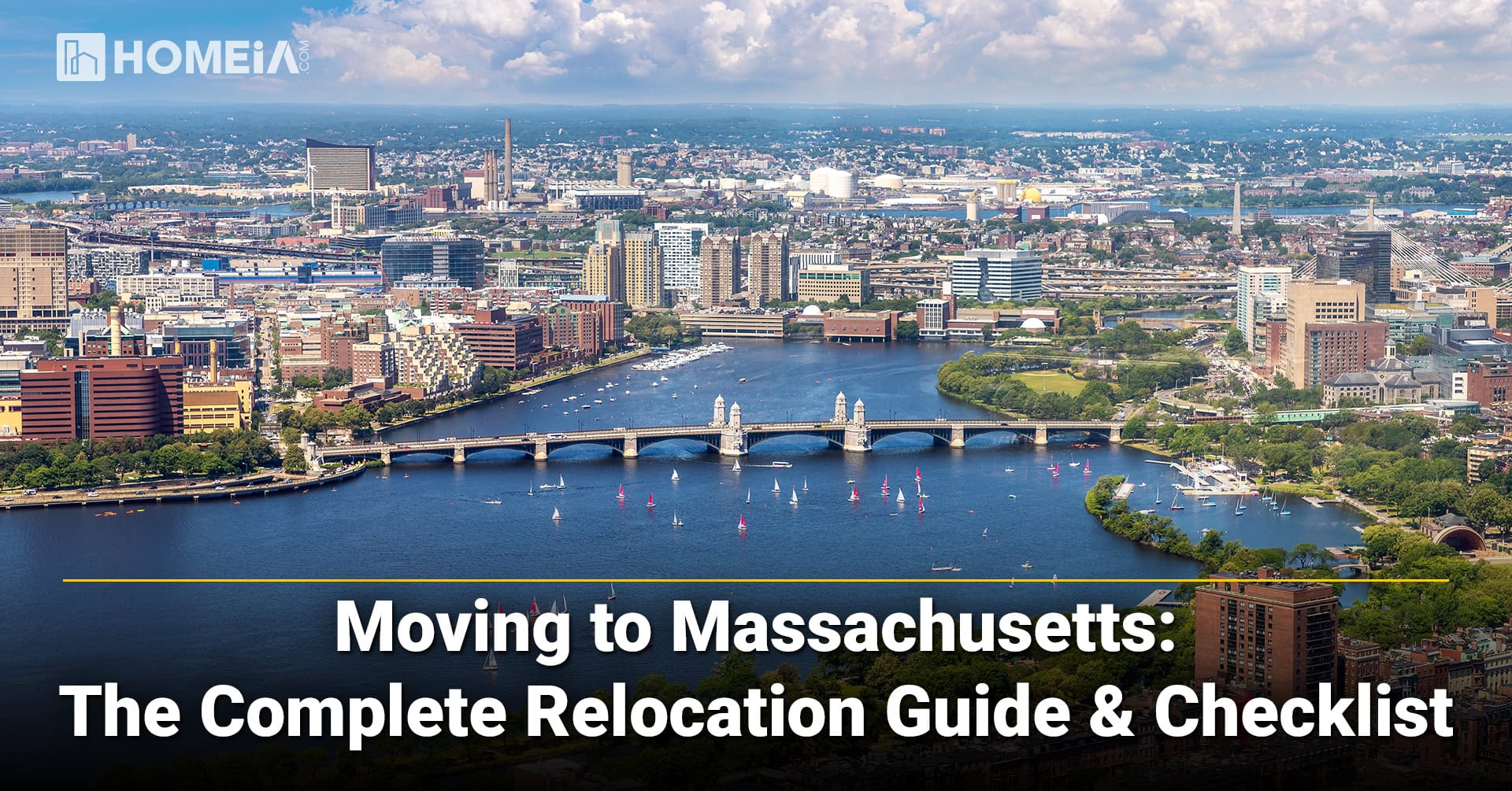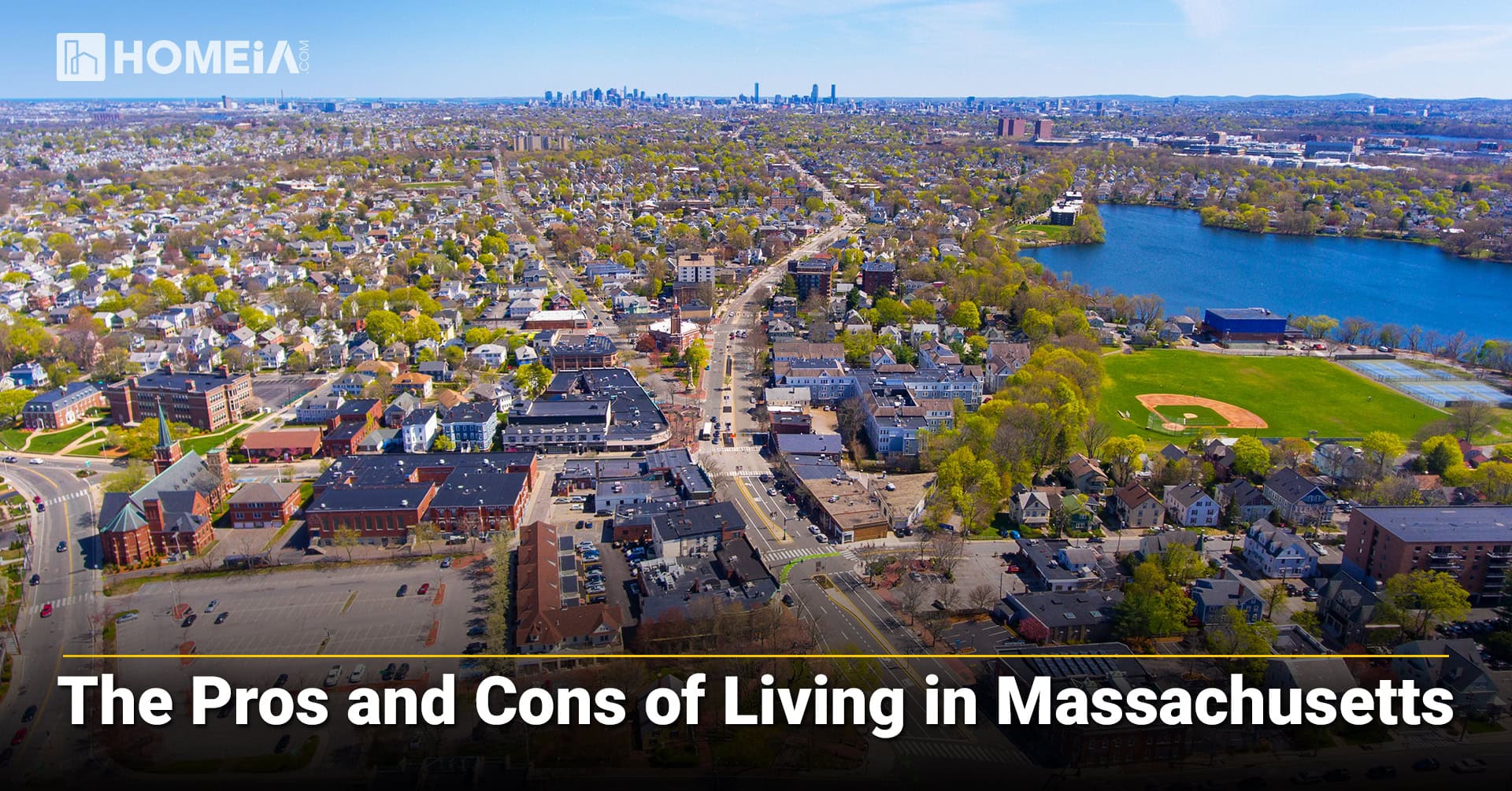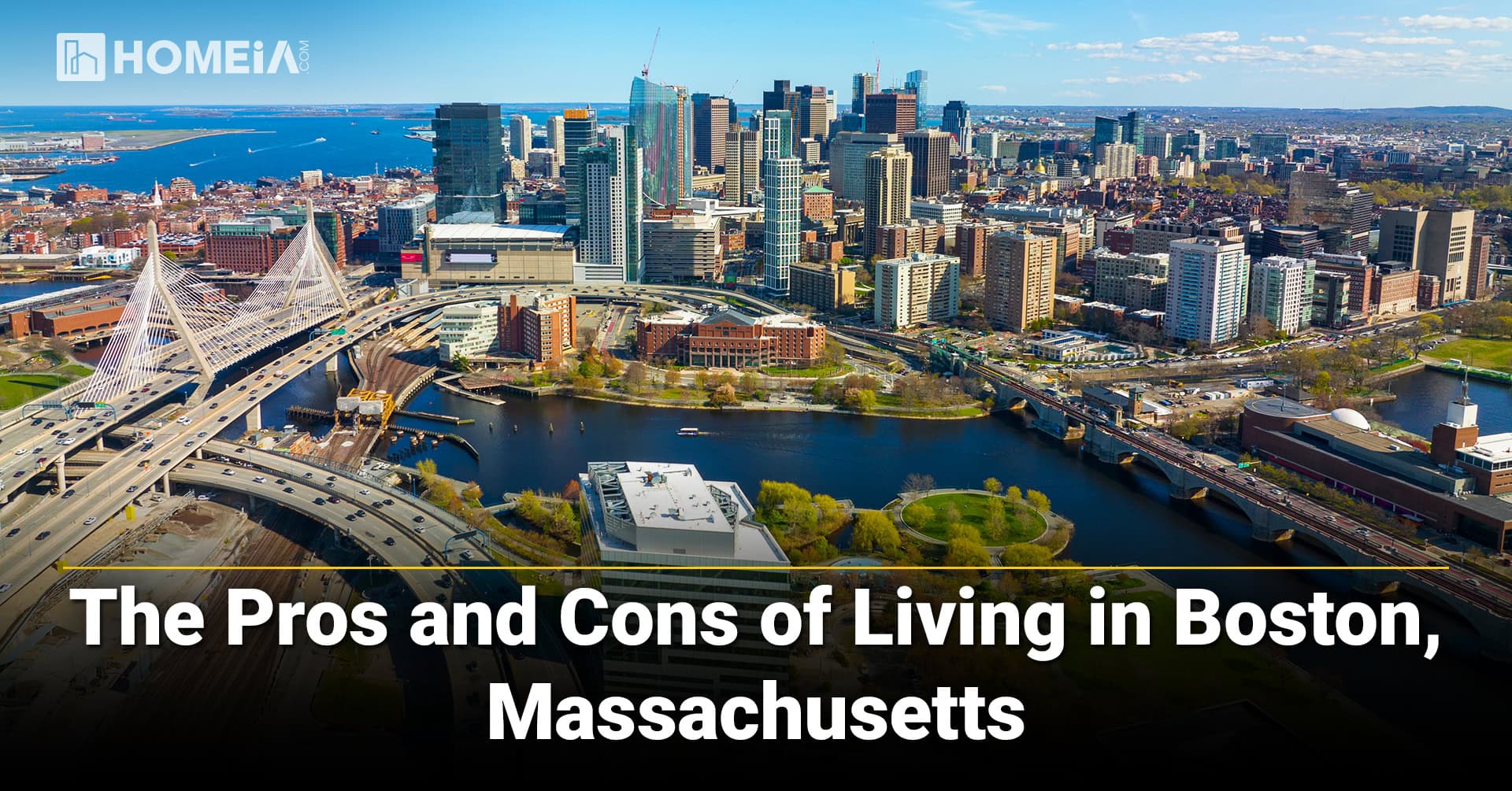Living in Massachusetts
Local Editor(s)
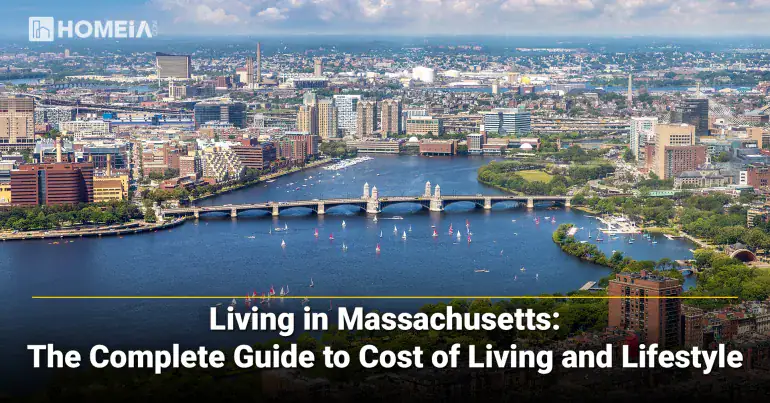
Table of Contents:
- The Complete Guide to Cost of Living and Lifestyle
- HOMEiA Score: Our Methodology
- 1. Massachusetts Housing Costs: From Urban Luxury to Rural Value
- 2. Massachusetts Cost of Living & Affordability
- 3. Massachusetts Economy and Career Opportunities
- 4. Massachusetts Tradition of Educational Excellence
- 5. Massachusetts Tax Structure: What to Expect
- 6. Best Places to Live: A Comprehensive City Guide
- 7. Planning Your Move to Massachusetts: A Detailed Timeline
- => Get the Relocation Guide & Checklist PDF — prepared for both Desktop and Mobile devices.
- 8. Massachusetts Rules and Requirements
- 9. Financial Adjustments and Budgeting for Massachusetts Living
- FAQs about Living in Massachusetts
The Complete Guide to Cost of Living and Lifestyle
Living in Massachusetts offers a unique blend of historic charm, world-class education, diversely quaint communities, and unique four season climate. Revered for its robust job market, rich culture, and vibrant city and small-town life, the Bay State attracts families, professionals, and students from across the globe. This comprehensive cost of living and lifestyle guide outlines housing costs, daily expenses, education, job opportunities, and more to help determine whether this premiere New England staple is the right place for your next chapter.
HOMEiA Score: Our Methodology
Our Methodologies to create HOMEiA Score Ratings for Each Group of Content
HOMEiA uses a consistent, data-driven methodology to evaluate U.S. states for livability, affordability, and long-term value. Our analysis centers on key factors such as Housing and Affordability, Cost of Daily Living, Access and Infrastructure, Community Strength, Safety and Quality of Life, Economic Resilience and Job Market…
1. Massachusetts Housing Costs: From Urban Luxury to Rural Value

Massachusetts real estate offers something for everyone, from stately brownstones in the sprawling metropolis of Boston and Cambridge to affordable homes in Springfield, Amherst, and the Berkshires. Home prices and rental rates vary depending on location, amenities, and proximity to jobs or universities. Understanding current housing market trends is vital for anyone considering a move to The Old Colony State, whether it’d be for anything from a luxury apartment to a more affordable family-friendly neighborhood. .
A. Major Massachusetts Cities Housing Costs
To put this into better perspective, a snapshot of median home prices, typical rents, and HOA fees in some of Massachusetts’ most popular cities and towns can be found below. These housing cost figures help to compare options and identify the best fit for your budget and lifestyle needs.
| City/Region | Median Home Price | 2-Bedroom Rent | 3-Bedroom Rent | HOA Fees |
| Boston | $739,000 | $3,200/month | $4,800/month | $400–$800/month |
| Cambridge | $1,050,000 | $3,400/month | $5,200/month | $500–$1,000/month |
| Worcester | $445,000 | $1,900/month | $2,700/month | $150–$350/month |
| Springfield | $275,000 | $1,600/month | $2,100/month | $100–$250/month |
| Pittsfield | $250,000 | $1,400/month | $1,900/month | $80–$200/month |
Boston, Cambridge, and Newton command premium prices due to proximity to jobs, universities, and cultural amenities. However, Western and Central Massachusetts cities like Springfield, Worcester, and Pittsfield provide more affordable housing options without sacrificing quality of life.
The Pros and Cons of Living in Massachusetts
This article presents the Pros and Cons of living in the Bay State, including the best cities for various demographic groups. We’ll provide insights to ease the always-daunting moving process and help find your perfect Massachusetts home…
2. Massachusetts Cost of Living & Affordability
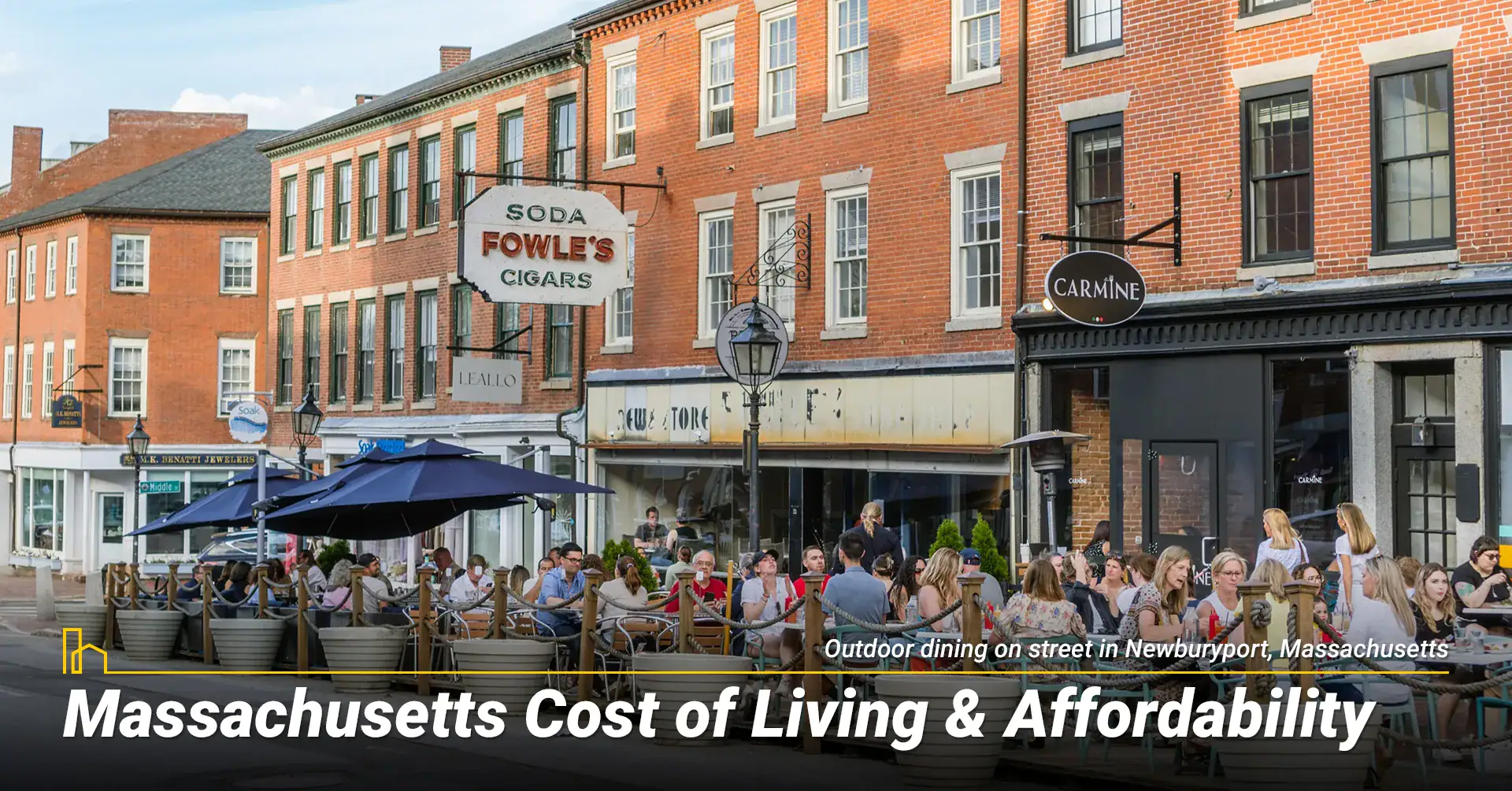
Living in the Northeast, especially Massachusetts, comes with a higher price tag than many other states. However, high wages and strong public services help to shut off any financial alarms this may set off to potential residents. It’s important to consider all recurring monthly expenses, not just housing costs, when planning a budget for any situation. Below, you’ll find a breakdown of typical utility and daily living expenses to help understand what a total month would net out to be.
A. Utilities and Daily Living Expenses
Utility and basic living expenses can vary based on how your home/apartment handles each of the state’s distinct seasons. Winters are notorious for driving up heating bills, while primeval homes tend to be less energy-efficient. Here’s what you can expect to pay each month for essential services, based on statewide averages for Massachusetts residents.
| Utility/Expense | Typical Monthly Cost |
| Electricity & Heat | $200–$350 (higher in winter) |
| Water/Sewer | $50–$90 |
| Internet/Cable | $60–$130 |
| Natural Gas | $30–$80 |
Many Massachusetts homes are older and less energy-efficient, so winter heating costs can be significant. Newer builds and condos often include energy-saving features to help manage utility expenses and reduce monthly bills.
B. Groceries and Transportation Costs
Beyond housing and utilities, groceries and transportation are two of the largest recurring expenses for in-state residents. Grocery prices are slightly above the national average, and transportation costs depend heavily on whether your main mode of transportation is public transit or driving. The table below provides expectations on what one would generally spend each month on these necessary living expenses.
| Category | Typical Monthly Cost/Range |
| Groceries | $350–$500 per adult |
| MBTA Pass | $90–$140 |
| Gasoline | $3.50–$4.00 per gallon |
| Boston Parking | $300+ |
Moving to Massachusetts? This all-in-one guide covers everything from cost of living and job opportunities to top towns and settlement tips. Whether you’re relocating from across the country or nearby, this relocation checklist ensures a smooth transition to the Bay State — helping you plan smartly and settle in with confidence…
Moving to Massachusetts: THE Complete Relocation Guide and Checklist
3. Massachusetts Economy and Career Opportunities

Mass is known for its dynamic, knowledge-driven economy, offering career opportunities in fields such as healthcare, education, tech, and finance. Their high average wages help offset the elevated cost of living, and major cities attract talent from all over the world. Below are the primary industries and employment centers that define its job market and economic landscape.
A. Major Industries and Employment Sectors
Massachusetts’ economy is anchored by several thriving sectors. In Boston and Cambridge, major companies in the healthcare (Mass General Hospital, CVS Health, Amwell) and life sciences (Pfizer, Merck) have headquarters and campuses situated here. For those looking for work in other fields, the Route 128 corridor bodes better, with it being famous for tech (Bose, Boston Science) and innovation (Raytheon, Thermo Fisher Scientific). Higher education (Harvard, MIT), finance, biotech, and tourism also play vital roles across the state, creating diverse employment opportunities for professionals in the beginning of their career and beyond.
B. Metropolitan Job Markets and Economic Centers
The state’s economic hubs each have their own strengths. Boston and Cambridge specialize in white-collar work. Worcester and Springfield offer more affordable living and a growing range of opportunities in predominantly blue-collar industries such as manufacturing (Smith & Wesson) and logistics (Providence & Worcester Railroad). These employment centers provide ideal work-life balance options for families and young professionals.
The Pros and Cons of Living in Boston, Massachusetts
This guide explores Boston public schools, neighborhood comparisons, weather patterns, and safety statistics to help you determine if this dynamic city, with its distinct seasonal changes and rich cultural offerings, aligns with your lifestyle priorities…
4. Massachusetts Tradition of Educational Excellence

Known for its education prowess, MA consistently ranks among the top states for K-12 public education and is home to some of the world’s most prestigious colleges and universities. Education is a major draw for families and students alike, with a variety of schooling options fitted to suit every need and goal.
A. Public School System Performance
Massachusetts public schools are known for their rigorous academic standards and high graduation rates. School choice programs, including charter schools, magnet schools, and vocational options. This provides families with flexibility and access to specialized curricula. The state’s commitment to educational excellence makes it an ideal destination for families with children.
B. Higher Education Institutions and Opportunities
With 104 colleges and universities throughout The Bay State, there’s no wonder why it’s considered a global academic powerhouse. World-renowned institutions like Harvard University, MIT, and Boston University dominate the headlines being in and around the city center, but outside this region, schools like Bentley University, Worcester Polytechnic Institute (WPI), Williams College, and Amherst College have built strong reputations of their own. Community colleges and technical schools like Berkshire CC and Benjamin Franklin Cummings Institute of Technology also offer affordable pathways to career advancement, and state financial aid programs help make higher education accessible to in-state residents.
The 10 Best Towns to Live in Massachusetts in 2026
As one of the central New England states, it’s highly desirable. According to WalletHub, which looked at the economy, education, quality of life, and safety, Massachusetts is the most desirable state in the nation. That’s some high praise! The only downside was affordability. It ranks as one of the most expensive to…
5. Massachusetts Tax Structure: What to Expect
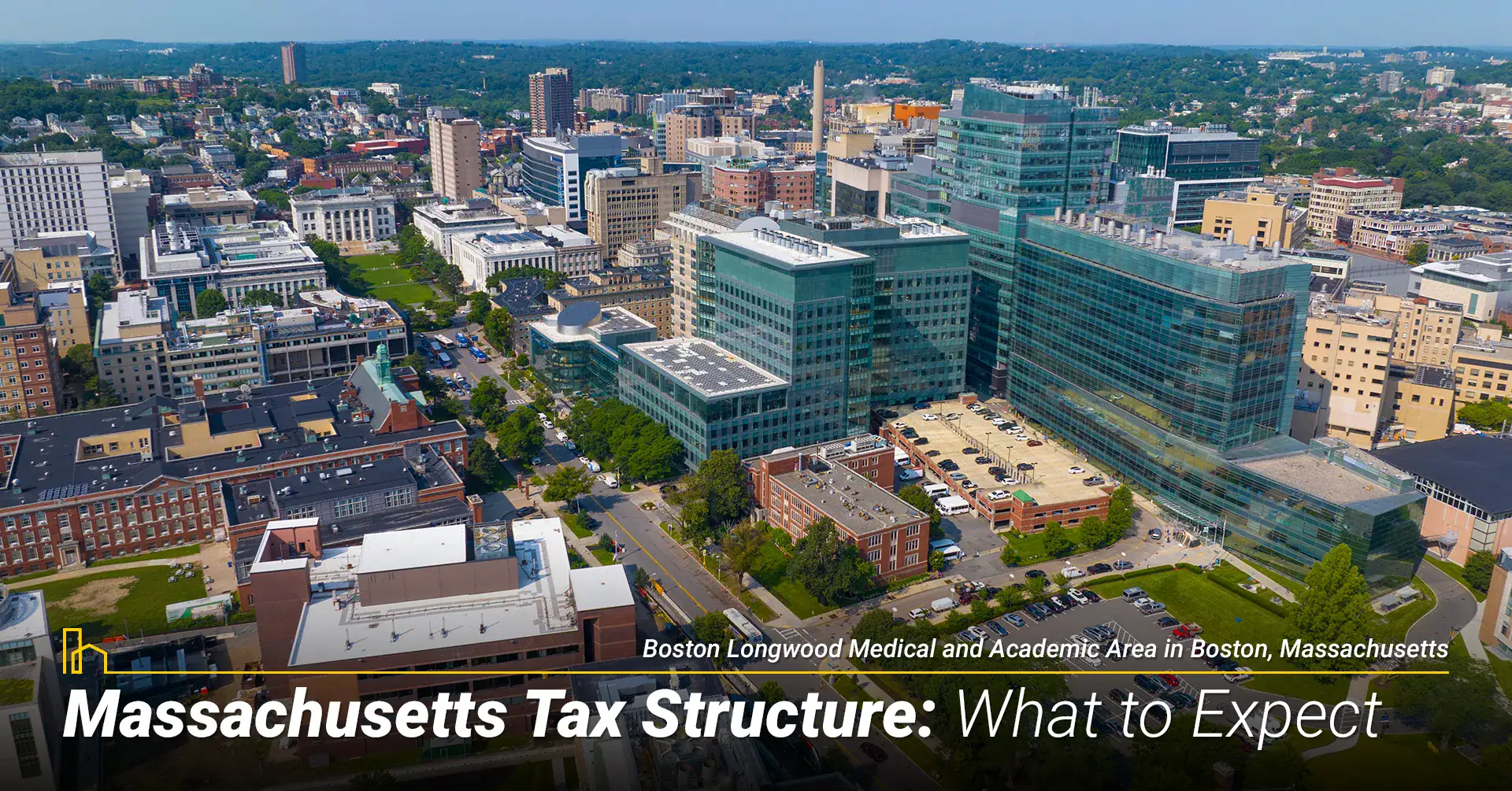
Taxes are a key consideration for any move. While Mass does not have the lowest tax burden, its flat income tax and moderate sales tax are offset by high-quality public services and infrastructure. The table below outlines the state’s main tax rates and recent changes that affect taxpayers.
| Tax Type | Rate/Notes |
| Income Tax | 5% flat rate on most income |
| Sales Tax | 6.25% statewide (no local add-ons) |
| Property Tax | Varies by municipality; high in suburbs |
| Recent Changes | Increased rental deduction, higher child and dependent tax credits, reduction in short-term capital gains tax for most residents |
Cheapest Places to Live in Massachusetts
Discover the cheapest places to live in Massachusetts with this helpful guide. From Boston’s city life to the peaceful Berkshires, explore affordable towns, top schools, vibrant communities, and diverse lifestyles…
6. Best Places to Live: A Comprehensive City Guide
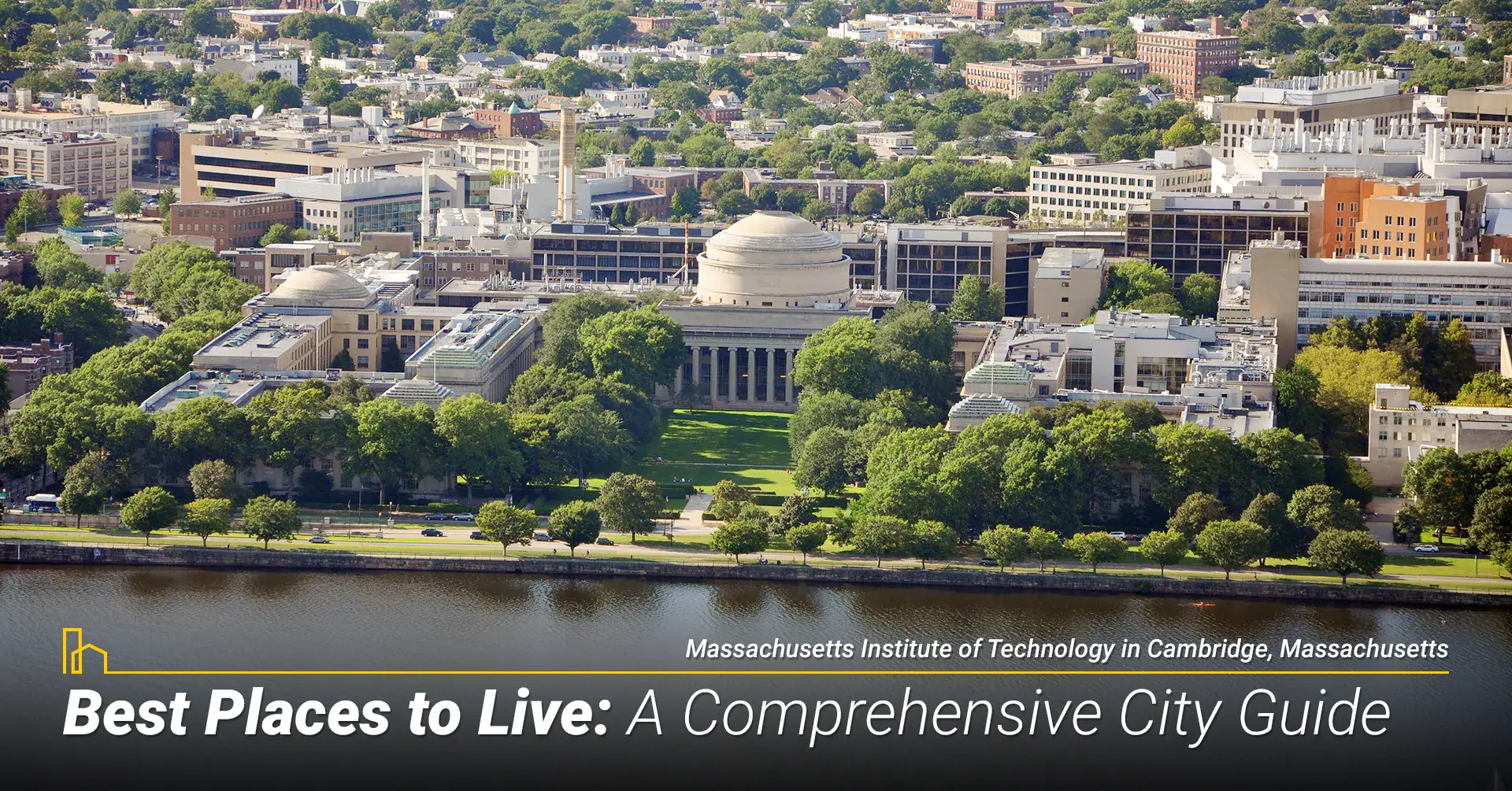
The state offers a wide range of living environments, from bustling urban centers to peaceful small towns. Each city and region has its own character, amenities, and cost profile. The table below highlights some of the best cities and towns to live in, their unique features, and key cost considerations for potential residents.
| City/Region | Highlights | Cost Considerations |
| Boston | Urban amenities, top jobs, sports, and culture | Highest housing costs |
| Cambridge | Academic and tech hub, walkable, vibrant | Very high home and rent prices |
| Worcester | Affordable, growing tech and healthcare sectors | Lower housing costs, rising demand |
| Springfield | Affordable, diverse, access to outdoors | Lower cost of living, revitalizing |
| North Adams/Pittsfield | Artsy, affordable, small-town charm | Lowest housing costs in the state |
| Cape Cod | Beaches, tourism, retirees | Expensive, especially in summer |
10 Important Things You Should Prepare for Long-Distance Moving
Moving long distances can be exciting, like an adventure of a lifetime. There is nothing as interesting and energizing as trying out new things and having the opportunity for a fresh start. But let’s be honest: moving is more complex than getting into a car or a bus and leaving for a new place…
7. Planning Your Move to Massachusetts: A Detailed Timeline
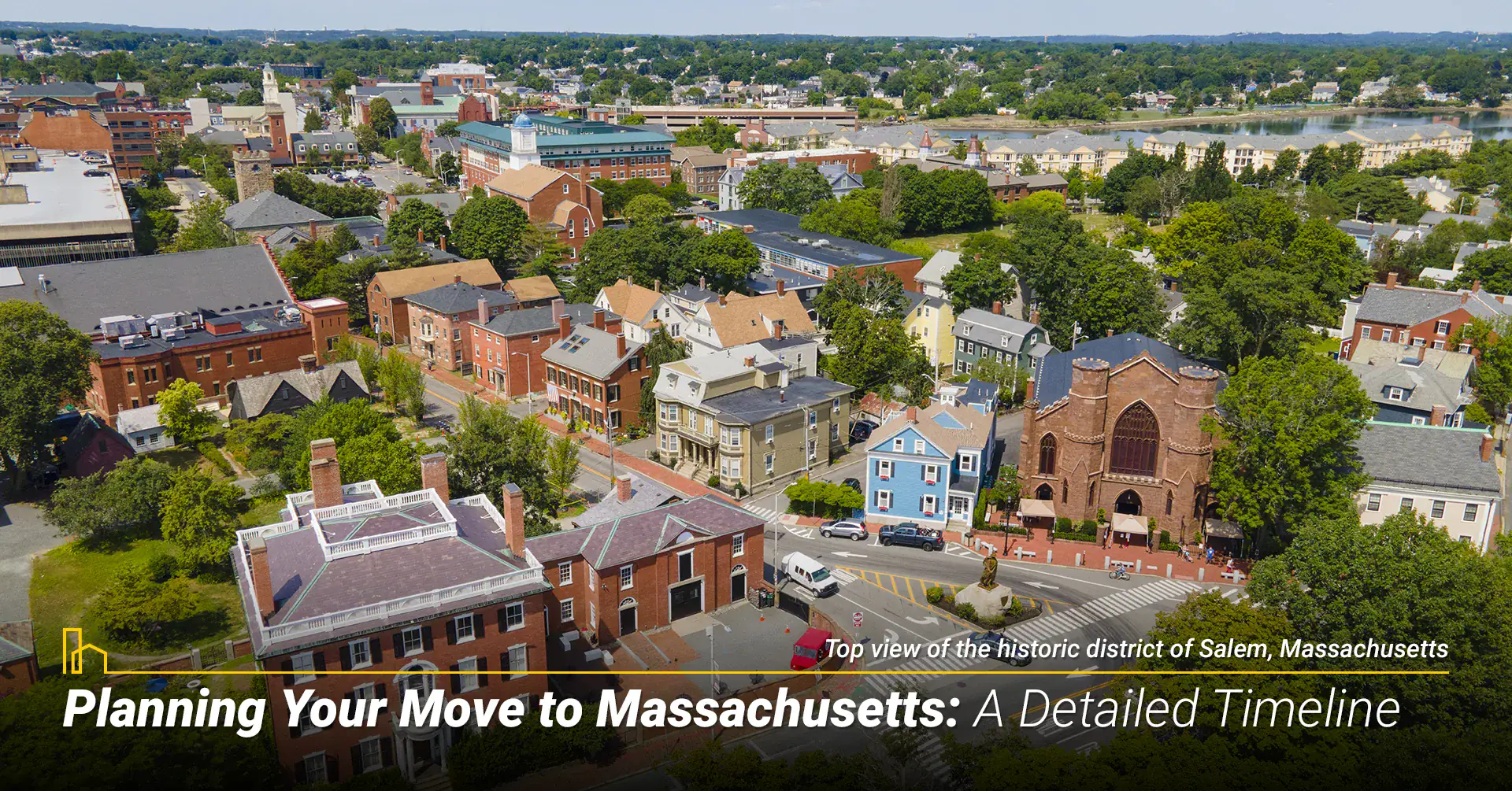
Relocating to any state, especially Massachusetts, is a serious commitment that requires careful preparation to make it go as smoothly as possible. The timeline below pinpoints key milestones and tasks that should be gradually completed within the half-year leading up to the move.
| Timeline | Action Items |
| 8–12 Weeks Out | Research cities, neighborhoods, and schools. Visit prospective areas. |
| 6-8 Weeks Out | Secure housing, budget for moving expenses, schedule movers. |
| 4-6 Weeks Out | Set up utilities, internet, and insurance. Notify banks, employers, and schools. |
| 2-4 Weeks Out | Register for local services, transfer prescriptions, update driver’s license and vehicle registration. |
| Move-In Week | Unpack, explore your new neighborhood, introduce yourself to neighbors. |
=> Get the Relocation Guide & Checklist PDF — prepared for both Desktop and Mobile devices.
Settling In: Practical Essentials for New Bay Staters
Adjusting to New England living means setting up essential services, meeting legal requirements, and getting involved in this new community. These steps help ensure a smooth transition and help you assimilate quicker.
A. Essential Services Setup
- Health Insurance is Mandatory: The state requires all residents over 18 to maintain health insurance or face tax penalties. There is a 63-day grace period after becoming a resident. Contact the Massachusetts Health Connector at (877) 623-6765 for comprehensive plans, or apply for MassHealth if eligible. Open enrollment runs November 1 through January 23.
- Banking and Financial Services: Citizens Bank operates 192 branches statewide, while local credit unions including Mass Bay Credit Union serve Suffolk, Norfolk, and Middlesex counties with competitive rates. Most institutions require two forms of ID and proof of Massachusetts address.
- Utility Services Setup: Contact providers early because activation can take several weeks. Major providers include Eversource for electricity and gas. It’s wise to set aside $200-350 monthly for electricity, $30-80 for natural gas, and $50-90 for water/sewer services.
B. Community Integration Resources
- Local Government Services: Each municipality offers welcome packets with information about local services, trash collection, and community programs. Contact the city or town hall you’re moving to for registration.
- Community Health Centers: Mass maintains 50 community health center organizations providing integrated medical and behavioral health services. Use the “Find a Health Center” search feature at mass.gov.
- Educational Resources: It offers free financial education resources through mass.gov, including workshops on budgeting and retirement planning. Materials are available in 10 different languages.
- Social Services: Community Action Agencies provide assistance with food, housing, fuel assistance, workforce development, and early childhood education for families with limited resources.
C. Building Social Networks
- Volunteer Opportunities: Massachusetts maintains extensive volunteer networks through organizations like the Massachusetts Commission for the Deaf and Hard of Hearing, immigrant services through the New American Association of Massachusetts, and community development corporations such as the Codman Square Neighborhood Development Corporation.
- Professional Networking: The state’s robust economy offers networking opportunities through industry associations, particularly in life sciences, tech, and healthcare. Boston and Cambridge host regular meetups and professional events with the Boston Chamber of Commerce consistently hosting these in the former.
- Neighborhood Connections: Many communities use Nextdoor for local communication, while town and city Facebook and Instagram groups provide real-time updates on events and services. Attend town meetings and community events to build connections.
Recommended for you
8. Massachusetts Rules and Requirements
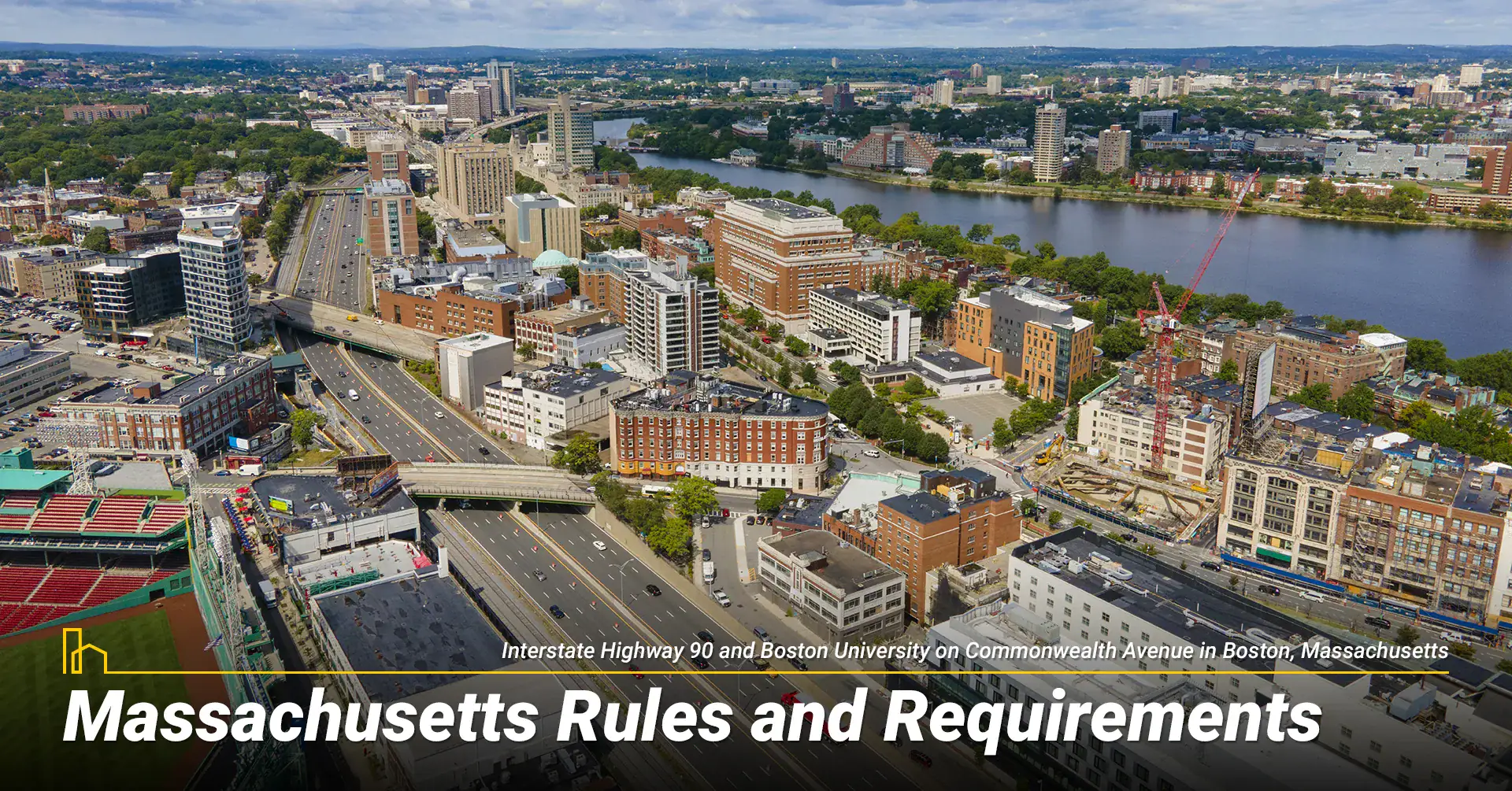
Massachusetts has specific rules for vehicle registration, inspections, and establishing residency. Understanding these requirements will help avoid unnecessary fines and ensure full compliance as a new resident.
A. Establishing Residency
- Legal Residency Requirements: A person is deemed a resident by maintaining a permanent place of abode in the state for more than 183 days per year. A formal application process is not needed – residency is established through your presence and intent to make Massachusetts home.
- Proof of Residency Documentation: Acceptable proof includes voter registration, driver’s license, vehicle registration, or utility bills in your name. For official purposes, documentation dated within 60 days of establishing residency is required.
B. Vehicle Registration and Licensing
- Driver’s License Transfer: New residents must transfer their out-of-state license immediately – a grace period does not exist. Visit an RMV Service Center with acceptable ID, proof of residency, and current license. The process is within the $50 range for a standard license.
- Vehicle Registration Requirements: Register your vehicle within 10 days of purchase or immediately upon becoming a resident. Required documents include proof of Massachusetts insurance (stamped by licensed agent), vehicle title or current out-of-state registration, completed RMV-1 application, and payment of registration fees ($60 for two years) plus 6.25% sales tax.
- Vehicle Inspection: Annual safety and emissions inspections are required by the state. New registrations must be inspected within seven days. Inspections tend to be in the $35-50 range at authorized stations.
C. Voter Registration
- Registration Process: Registration is able to be completed online (requiring valid driver’s license), by mail using the National Mail Voter Registration Form, or in-person at election offices. The registration deadline is 10 days before all elections.
- Automatic Voter Registration: The VOTES Act mandates that the RMV automatically provides eligible residents’ information to the Secretary of State for voter registration when conducting driver’s license transactions, with an opt-out option available.
- Voter Requirements: You must be a U.S. citizen, 18 years old by election day (16-year-olds can pre-register), and a Massachusetts resident. There’s no residency waiting period – you can register immediately upon moving.
D. Health Insurance Compliance
- Individual Mandate: The state maintains an individual health insurance mandate with penalties for non-compliance. Monthly penalties vary based on age and income, with a three-month grace period for coverage gaps.
- Minimum Creditable Coverage: Health plans must meet Minimum Creditable Coverage (MCC) standards, including essential health benefits, preventive services, and pre-existing condition coverage. Most employer and marketplace plans meet these requirements.
15 Things People Usually Forget When Moving
Whether or not you decide to hire a professional moving company, this guide includes everything you need for completing your move. It’s always best to have this list handy so you can check off each task and know that you’re on top of everything…
9. Financial Adjustments and Budgeting for Massachusetts Living
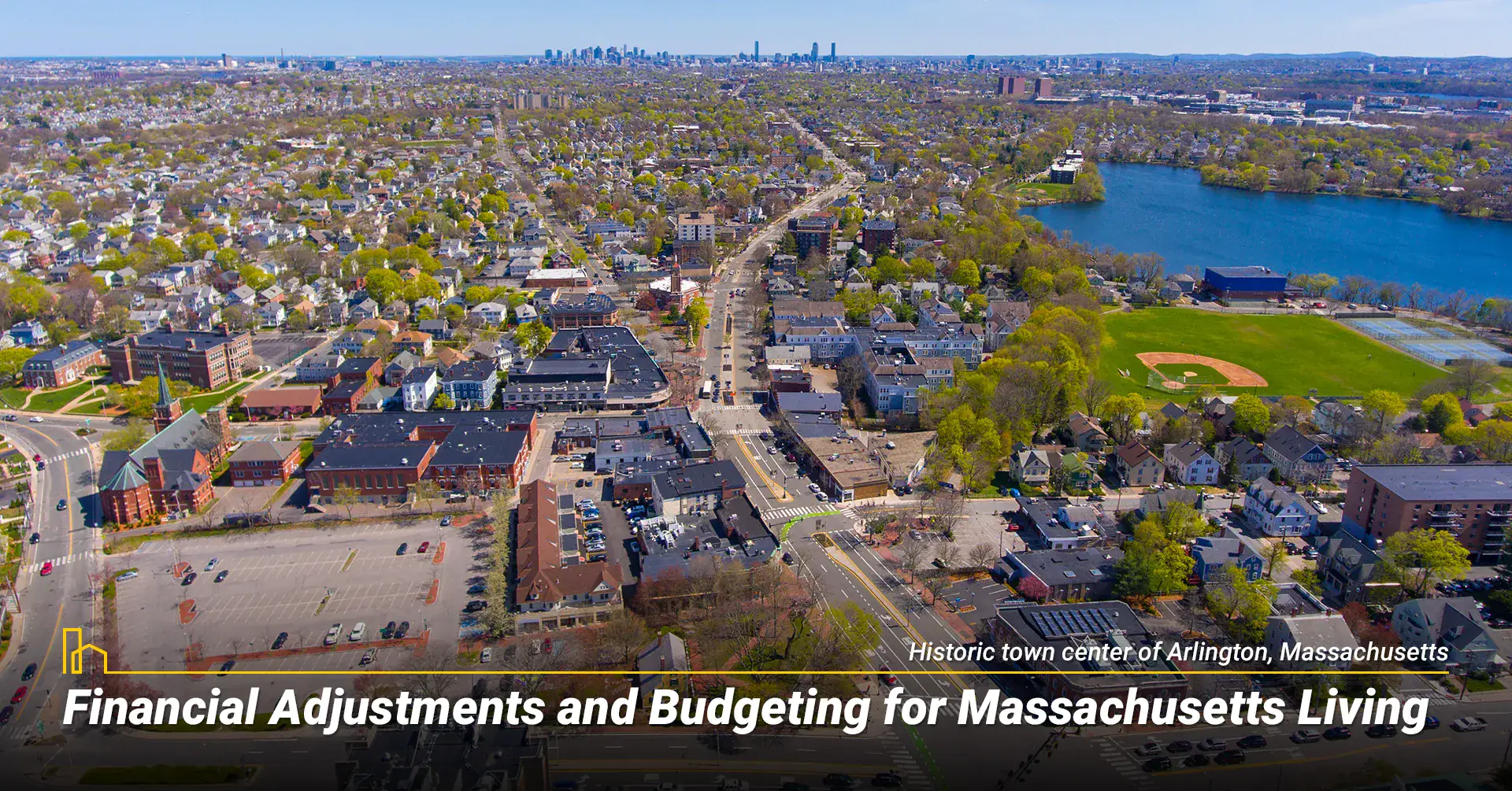
Budgeting is crucial when moving to a high-cost state like Massachusetts. By allocating your income wisely, the ability to enjoy all the state has to offer while maintaining financial stability will come easier.
A. Recommended Budget Allocation
Understanding cost structure helps for optimizing budget allocation. The state’s high costs are offset by higher wages, but careful planning remains essential.
| Expense Category | Recommended % of Budget | Massachusetts Considerations |
| Housing | 30–50% | Higher in Boston/Cambridge area; consider location vs. commute costs |
| Utilities | 5–10% | Winter heating costs can spike significantly |
| Groceries | 10–15% | 6.6% above national average; farmers markets offer savings |
| Transportation | 10–15% | MBTA pass vs. car ownership costs vary significantly |
| Healthcare | 5–10% | Mandatory insurance; factor in co-pays and deductibles |
| Miscellaneous/Entertainment | 10–15% | Many free cultural activities available |
B. Massachusetts-Specific Financial Strategy
- Housing Cost Management: Consider affordable regions like Worcester, Springfield, or Pittsfield for lower housing costs while maintaining access to quality services. Calculate total commuting costs when comparing locations.
- Transportation Optimization: Compare MBTA annual passes ($1,080-1,680) against car ownership costs ($6,720 annually taking into account insurance, gas, and parking). Many residents find public transit more economical for their daily commutes.
- Tax Planning: Massachusetts’ 5% flat income tax simplifies planning, but the new 4% surtax on income over $1.053 million affects high earners. Take advantage of tax credits including the Child and Family Tax Credit ($440 per dependent).
- Utility Cost Management: Budget for seasonal heating variations, with winter bills potentially doubling. The best way to do this is investing in energy-efficient appliances and weatherproofing. Additionally, certain utility companies offer budget billing plans to spread costs evenly.
C. Emergency Fund and Savings Priorities
- Emergency Fund Sizing: Its high cost of living requires larger emergency funds. Aim for 6-8 months of expenses rather than the typical 3-6 months, to account for the generally higher baseline costs.
- Education Savings: Take advantage of the Massachusetts U.Fund 529 College Investing Plan. It provides a $50 initial deposit for every child born or adopted in Massachusetts. The state’s strong educational opportunities make college savings particularly valuable.
- Healthcare Savings: Health Savings Accounts (HSAs) offer triple tax advantages for in-state residents with high-deductible health plans. Factor in the state’s mandatory insurance requirements when planning healthcare budgets.
D. Available Financial Assistance Programs
- Housing Assistance: Massachusetts Rental Voucher Program (MRVP), Emergency Assistance (EA) shelter system, and Residential Assistance for Families in Transition (RAFT) providing emergency rental assistance are offered to income-eligible households.
- Utility Assistance: The Low-Income Home Energy Assistance Program (LIHEAP) helps with heating costs during the winter. Contact the Cold Relief Heatline at (800) 632-8175. Massachusetts also offers energy efficiency programs through utility companies.
- Food Security: SNAP benefits and local food banks provide crucial support. Community Action Agencies offer comprehensive assistance including nutrition education and application help for various benefit programs.
- Financial Education: Free financial education resources are provided through workshops, webinars, and one-on-one counseling. The Office of Financial Empowerment offers services at financial opportunity centers throughout the state.
Strategic budgeting is essential for living here. High costs are balanced by excellent services, strong job market, and quality of life benefits.
| Expense Category | Recommended % of Budget |
| Housing | 30–50% |
| Utilities | 5–10% |
| Groceries | 10–15% |
| Transportation | 10–15% |
| Healthcare | 5–10% |
| Miscellaneous/Entertainment | 10–15% |
Strategic budgeting is essential for Massachusetts living. Consider moving to more affordable regions (like Worcester, Springfield, or North Adams) for lower cost-of-living.
Conclusion: Ready to Go? Your Massachusetts Adventure Awaits!
Massachusetts is a state rich in history, culture, and opportunity. While the cost of living is high, the quality of life, educational excellence, and vibrant communities make up for it. Whether you’re seeking career advancement, top schools, or the best seafood in New England, you’ll find it here in the Bay State.
Recommended for you
FAQs about Living in Massachusetts
1. What are some local customs or etiquette tips for new residents?
Local residents value punctuality, direct communication, and respect for personal space. It’s common to greet neighbors with a friendly nod, but small talk may be brief, especially in urban areas. Participating in local events, volunteering, or joining community groups is a great way to build connections and feel at home in your new community.
2. How can I prepare for Massachusetts winters if I’m new to the region?
Invest in quality winter clothing, including insulated boots, a heavy coat, gloves, and hats. Make sure to weatherproof the house and have the car be equipped to handle snow and ice (ex. All-Wheel Drive with snow tires and an emergency kit). Learning to drive in snowy conditions is essential for safe winter travel in New England.
3. What are some tips for navigating Boston’s public transportation system?
The MBTA (“the T”) covers much of Greater Boston and surrounding areas. Purchase a CharlieCard for discounted fares and plan trips with real-time apps. Trains can be crowded during rush hour and delays are common, so plan for 20-30 minutes of extra time to account for this. When traveling from the suburbs, explore commuter rail options and check schedules for weekend or holiday service changes.
4. Are there any unique local foods or markets I should try?
Well it’s not named The Codfish State for nothing! Don’t miss New England clam chowder, lobster rolls, and Boston cream pie. Farmers’ markets and produce stands are popular in spring and summer, and local bakeries offer specialties like Anadama bread. Visit the North End for authentic Italian cuisine and try seasonal apple cider donuts at fall harvest festivals throughout Massachusetts.
5. How do I find affordable entertainment and recreation in Massachusetts?
Many museums, parks, and cultural sites offer free or discounted admission to in-state residents. Look for community concerts, outdoor movie nights, and town festivals, especially in summer and fall. Hiking, biking, and exploring state parks are cost-effective ways to enjoy the outdoors year-round.
6. What should I know about recycling and environmental practices?
Known for its robust recycling programs, most towns require separating recyclables from trash. Composting is encouraged in many communities. Bring reusable bags for shopping, as some cities charge 5-25 cents per plastic bag or have banned them entirely to support environmental sustainability.
15 Things People Usually Forget When Moving
Whether or not you decide to hire a professional moving company, this guide includes everything you need for completing your move. It’s always best to have this list handy so you can check off each task and know that you’re on top of everything…
7. How can I quickly build a social network after moving?
Join local clubs, sports leagues, or parent-teacher organizations in your new community. The norm amongst these towns are that they have active Facebook groups or use apps like Nextdoor for neighborhood news and events. Volunteering is a great way to meet people and give back to your new community.
8. Are there any annual events or traditions I should look forward to?
Yes! Highlights include Boston’s Marathon Monday and Boston Calling Music Festival, Opening Day at Fenway Park, Fourth of July celebrations on the Esplanade, fall foliage festivals in the Berkshires, and First Night Boston on New Year’s Eve. Each region has its own beloved seasonal fairs and parades that showcase Massachusetts culture and traditions.
9. What are some common challenges for newcomers, and how can I overcome them?
Adjusting to the high cost of living, learning to navigate traffic, and adapting to the fast pace of city life can be tough for new Bay Staters. Take time to explore the area, ask neighbors for recommendations, and be patient as you settle in—most newcomers find their groove within a few months.
10. Where can I find more resources for new residents?
Check the town or city’s official website for welcome packets, local guides, and event calendars. The Massachusetts Office of Travel & Tourism and local chambers of commerce are excellent sources for information about services, attractions, and community programs for new residents both new and old.
Local Editor(s)
Moving to Massachusetts: THE Complete Relocation Guide and Checklist
Hey there! Thinking about making the move to the great state of Massachusetts? Then you're in for a real treat, and we’re not talking about Boston Cream Pies. We're a…
The Pros and Cons of Living in Massachusetts
Moving to a new part of the US requires careful consideration of both the state itself and the specific community you'll join. If Massachusetts is your next destination, you'll find…
The Pros and Cons of Living in Boston, Massachusetts
Considering moving to Boston in 2025? This historic yet innovative city offers a unique blend of old-world charm and modern opportunity. As New England's economic and cultural hub, Boston attracts…
The 10 Best Towns to Live in Massachusetts in 2026
Massachusetts is a state with a rich history, a vibrant culture, and a thriving economy. With excellent schools, great job opportunities, and an unparalleled quality of life, it's no wonder…
Cheapest Places to Live in Massachusetts
Born in the Colonial Era and raised by innovation, Massachusetts offers a rich tapestry of New England charm, world-class universities, and vibrant communities. From the bustling streets of Boston to…
For High-End Relocations, Luxury Moving Companies Deliver
Standard moving companies are a dime a dozen. In almost every community, you can find a crew to pack up your belongings, load your boxes and furniture into a truck,…
27 Questions to Ask When Hiring a Moving Company
Hiring a moving company can be pretty daunting. You're entrusting strangers with all your precious belongings, and you want to make sure they’re adequately insured, experienced, and licensed. But how…
Important Things to Consider Before Hiring a Moving Company
Moving to a new home can be an overwhelming task, and the process can easily become stressful if you don’t have help. That’s where moving companies come in, but not…
Moving to Massachusetts: THE Complete Relocation Guide and Checklist
Hey there! Thinking about making the move to the great state of Massachusetts? Then you're in for a real treat, and we’re not talking about Boston Cream Pies. We're a state infused with a storied past, leading innovation, and community…

 Considering
Considering

















